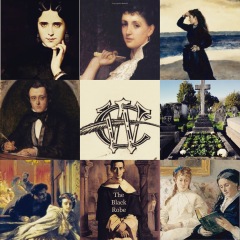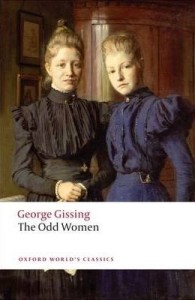(So, as we say in the business; readers who do not wish to learn details of the plot can skip this review at your own wish…)
Regarding my reading experience, the fairer characters in fiction, who step into the stage of maidenhood or living in “single blessedness”, are more often portrayed negatively. For instance, Miss Clack, the “Rampant Spinster”, is the subject of ridicule and idleness. Concerning the phenomenon of telescopic philanthropy in The Moonstone (1868) by Wilkie Collins, she fanatically helps out with church affairs and a committee called “The Mothers’-Small-Clothes-Conversion-Society”, in which she deals with men’s unmentionables regardless of her own’s proprieties and conducts concerned.
Take a glance of Jane Wilson from The Tenant of Wildfell Hall (1848) by Anne Brontë; while unable to identify with such “vulgar people in the eyes of the world”, she takes lodging in a county town and ends up “doing no good to others but little to herself, spending in her days in fancy-work and scandal” in her ways of “closefisted, cold, uncomfortable gentility”. Others might include Miss Matty and Miss Wade being invented in novels of Cranford and Little Dorrit in 1850s by Elizabeth Gaskell and Charles Dickens respectively. Modern fictional characters I have read would be the formidable aunts by P. G. Wodehouse. In other cases, one of the most interesting characters would be Marian Halcombe from The Woman in White (1860), perceived as strong, independent, intelligent, and be capable of anything.
“[T]hough in single life your joys may not be very many, your sorrows, at least, will not be more than you can bear. Marriage may change your circumstances for the better, but, in my private opinion, it is far more likely to produce a contrary result.” In The Tenant of Wildfell Hall, Helen Graham aka the marriage guru gives wise counsel that marriage is a constitution of “approval and love”.
The Odd Women by George Gissing, on the other hand, places topics of marriage and singletons on whole new perspectives directing to many facets, which definitely will be one of the most devouring and best novels I have read this year.


Excellent post! The unmarried ladies of literature are not generally portrayed in the best light. It has often seemed to me that there was an underlying fear of them. Fear perhaps of the independent woman who needed neither husband nor children to be complete? I wonder.
Hi Mimi, thanks for the comment! The Odd Women by George Gissing is a novel full of social purposes, it’s the most comprehensive novel to me when literally and seriously examining women of classes with many facets. I am now reading a Josephine Butler’s biography, a feminist concerned with rights to vote, rational training in women as well as the fallen and unprivileged. She’s also a prominent figure defying values of contemporary society. I’m also looking forward to your recommendations! 🙂
I’ll have to give it some thought and see if I can think of any really good recommendations! Meanwhile, I am definitely putting the two you’ve mentioned on my ‘to be read’ list 🙂
Pleasure! It’s called “Patron Saint of Prostitutes: Josephine Butler and a Victorian Scandal”